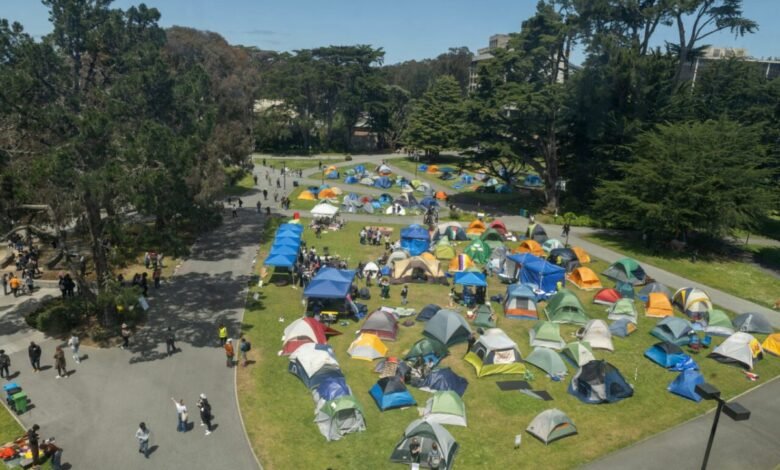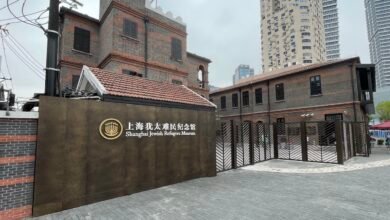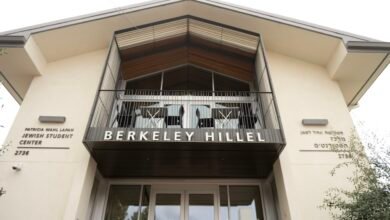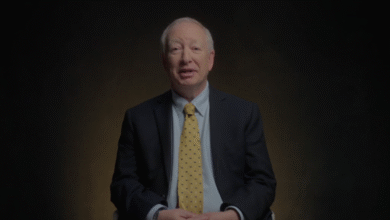
Pro-Palestinian activists were celebrating what they considered a win at San Francisco State University this week, even as a top administrator pushed back on some of their claims.
The SF State Foundation, which manages the university’s endowment and oversees a portfolio of upward of $160 million, voted Thursday to approve a new investment policy following monthslong negotiations with campus protesters.
The policy does not name Israel or anything related to the Israeli-Palestinian conflict. Instead, it restricts investment in weapons manufacturers and companies that “facilitate or enable severe violations of international law and human rights.”
The vote, which was unanimous with one abstention, according to KQED, followed more than a year of activism from students and faculty calling on the university to divest from Israel, accusing the country of being a colonial outpost that commits genocide and practices apartheid. Student activists at SF State have long pressed for the university to divest from Israel, but those calls intensified after the Oct. 7, 2023, Hamas attack on Israel and amid the ensuing war in Gaza.
Activists heralded Thursday’s vote as a victory.
“Divestment vote passes,” read an Instagram post written in all caps from the General Union of Palestine Students at SFSU. “Following our encampment protesting SF State’s complicity in Israel’s genocide of the Palestinian people, SF State divested from four human rights abusers,” the post stated. Activists had called on supporters to “pack the meeting” at the Seven Hills Conference Center in San Francisco.
Jeff Jackanicz, president of the SF State Foundation, described the private negotiations between the foundation and campus protesters over the summer in an interview with J.

Jackanicz, who voted in favor of the new policy, said there were “back and forth” discussions between the student activists and administration. The protesters repeatedly called on the foundation to cut all ties with Israel as part of the boycott, divestment and sanctions (BDS) movement, but Jackanicz said the foundation refused to do so.
“They would come to us with certain demands,” he said Friday. “We would push back and say we’re not willing to entertain BDS as a possibility, nor are we willing to do anything that would essentially be a proxy for BDS.”
He added that there were “some areas where we do think we could make some changes that are consistent with our existing value set.”
Jackanicz characterized the decision on weapons manufacturers as a modest one that is “industry standard” among portfolio managers concerned with ethical investing.
“The investment committee and I deliberated about it and decided that it was consistent with the values of the institution and the foundation,” he said.
Like at scores of universities across the country, pro-Palestinian students at SF State assembled a tent encampment over the spring to protest the war in Gaza. Roughly a week later, administrators began negotiating with protest leaders.
On May 6, seated on a folding chair ringed by more than a hundred student and faculty activists, SFSU President Lynn Mahoney and two other administrators listened to their concerns. Mahoney told the group that while the university would not entertain “region-specific” investment changes, she was open to a conversation about changing the investment policy “to better align with our role as an agent of social justice.”

Activists viewed the foundation’s decision this week as the culmination of their efforts.
The foundation has already begun the process of unwinding its weapons investments, Jackanicz told J.
Over the summer, it divested from Maryland-based aerospace and defense company Lockheed Martin, Italian aerospace company Leonardo and Denver-based defense software maker Palantir. Jackanicz estimated the foundation’s holdings in those companies to have been “in the low hundreds of thousands of dollars.”
The foundation also divested this summer from Caterpillar, a Texas-based heavy machinery company targeted by BDS activists. Jackanicz said the company was dropped because of its excessive carbon footprint — not because it sells equipment to Israel’s military.

Marc Dollinger, a Jewish studies professor at SF State who has been a supporter of the administration’s handling of campus protests, said that in his view, the foundation had actually sidestepped activists’ demands.
“I don’t see a single thing SF State passed which could be seen, in any way, as BDS,” he told J. after the vote.
Regarding the protesters’ call for SF State to divest from Israel, Dollinger added, “They got to make their case to the foundation board. They made their case. The foundation board rejected it.”
Dollinger said he sees the foundation’s decision as aligned with the character of SF State, long a center of social justice.
“What happened is they did human rights screens, screens that I think any social justice-oriented university would do. Sure, San Francisco State University is not going to invest in weapons manufacturers. That’s a very SF State thing to do,” he added. “It has nothing to do with Israel.”




